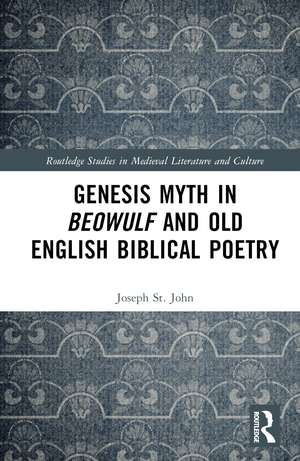Genesis Myth in Beowulf and Old English Biblical Poetry: Routledge Studies in Medieval Literature and Culture
Autor Joseph St. Johnen Limba Engleză Hardback – 31 iul 2024
The book explores how the Genesis poems resort to the Christian exegetical tradition and draw on secular social norms to deliver their biblically derived and related narratives in a manner relevant to their Christian Anglo-Saxon audiences. In this book it is suggested that these elements work in unison, and that the two Genesis poems function coherently in the context of the Junius 11 manuscript. Moreover, the book explores recourse to Genesis-derived myth in Beowulf, and points to important similarities between this text and the Genesis poems. It is therefore shown that while Beowulf differs from the Genesis poems in several respects, it belongs in a corpus where religious verse enjoys prominence.
Din seria Routledge Studies in Medieval Literature and Culture
-
 Preț: 389.66 lei
Preț: 389.66 lei -
 Preț: 443.69 lei
Preț: 443.69 lei -
 Preț: 389.66 lei
Preț: 389.66 lei -
 Preț: 469.34 lei
Preț: 469.34 lei - 17%
 Preț: 256.67 lei
Preț: 256.67 lei -
 Preț: 251.32 lei
Preț: 251.32 lei - 17%
 Preț: 258.70 lei
Preț: 258.70 lei -
 Preț: 389.66 lei
Preț: 389.66 lei - 17%
 Preț: 269.00 lei
Preț: 269.00 lei -
 Preț: 383.50 lei
Preț: 383.50 lei -
 Preț: 382.91 lei
Preț: 382.91 lei -
 Preț: 383.89 lei
Preț: 383.89 lei - 20%
 Preț: 276.70 lei
Preț: 276.70 lei -
 Preț: 381.98 lei
Preț: 381.98 lei -
 Preț: 386.61 lei
Preț: 386.61 lei -
 Preț: 390.41 lei
Preț: 390.41 lei -
 Preț: 389.66 lei
Preț: 389.66 lei -
 Preț: 389.66 lei
Preț: 389.66 lei - 17%
 Preț: 257.25 lei
Preț: 257.25 lei -
 Preț: 389.66 lei
Preț: 389.66 lei -
 Preț: 389.66 lei
Preț: 389.66 lei -
 Preț: 385.04 lei
Preț: 385.04 lei - 18%
 Preț: 1109.18 lei
Preț: 1109.18 lei -
 Preț: 385.47 lei
Preț: 385.47 lei
Preț: 1000.76 lei
Preț vechi: 1220.44 lei
-18% Nou
Puncte Express: 1501
Preț estimativ în valută:
191.49€ • 199.93$ • 158.49£
191.49€ • 199.93$ • 158.49£
Carte tipărită la comandă
Livrare economică 05-19 aprilie
Preluare comenzi: 021 569.72.76
Specificații
ISBN-13: 9781032621784
ISBN-10: 1032621788
Pagini: 220
Ilustrații: 14
Dimensiuni: 152 x 229 mm
Greutate: 0.47 kg
Ediția:1
Editura: Taylor & Francis
Colecția Routledge
Seria Routledge Studies in Medieval Literature and Culture
Locul publicării:Oxford, United Kingdom
ISBN-10: 1032621788
Pagini: 220
Ilustrații: 14
Dimensiuni: 152 x 229 mm
Greutate: 0.47 kg
Ediția:1
Editura: Taylor & Francis
Colecția Routledge
Seria Routledge Studies in Medieval Literature and Culture
Locul publicării:Oxford, United Kingdom
Public țintă
PostgraduateNotă biografică
Joseph St. John completed his doctoral degree at the University of Malta in 2023. The focus of his research was the adaptation of Genesis themes in Old English poetry, specifically Genesis A, Genesis B, and Beowulf. He also published an article titled ‘The Meaning Behind Beowulf’s Beheading of Grendel’s Corpse’, on Leeds Medieval Studies, in 2021; a note titled ‘The Character Helle in De Resurrectione Domini, the Old English Cotton Vespasian D.xiv Version of Christ’s Descent into Hell in the Gospel of Nicodemus’, on ANQ: A Quarterly Journal of Short Articles, Notes and Reviews, in 2022; an article titled ‘Ac ic to þam grunde genge: an analogue for Genesis B, line 834a’, on The Explicator, which first appeared online in 2023, and an article titled ‘The Archetype in the Genesis A Adaptation of the Cainite Genealogy’, on ANQ: A Quarterly Journal of Short Articles, Notes and Reviews, again in 2023. Moreover, the author has delivered lectures about Beowulf, Sir Gawain and the Green Knight, and Chaucer’s early poetry at the University of Malta.
Cuprins
List of Figures
Foreword
Acknowledgements
Introduction
Ch. 1- The Angelic Myth in Genesis A and Genesis B
Background: Angelic Creation, Rebellion, and Fall in the Christian Tradition
Angelic Creation, Rebellion, and Fall in Genesis A and Genesis B
Satan and Hell in Genesis B
Ch. 2 Creation in Genesis A and Beowulf
Literary Background
The Creation in Genesis A
The Creation in Beowulf
Ch. 3 Adam and Eve’s Temptations and Transgression in the Genesis Poems
Background: Genesis B’s Interpolation into Genesis A and its Approach to Biblical Versification
Temptations and Transgression in Genesis B
Confession and Expulsion in Genesis A
Ch. 4 Cain’s Fratricide and Related Narratives in Genesis A and Beowulf
Literary and Exegetical Background
The Cain Myth in Genesis A
The Cain Myth in Beowulf
Ch. 5 The Great Flood in Genesis A and Beowulf
Exegetical and Literary Background
The Great Flood in Genesis A
The Drowning of the Giants in the Great Flood and its Significance in the context of Beowulf
Conclusion
Index
Foreword
Acknowledgements
Introduction
Ch. 1- The Angelic Myth in Genesis A and Genesis B
Background: Angelic Creation, Rebellion, and Fall in the Christian Tradition
Angelic Creation, Rebellion, and Fall in Genesis A and Genesis B
Satan and Hell in Genesis B
Ch. 2 Creation in Genesis A and Beowulf
Literary Background
The Creation in Genesis A
The Creation in Beowulf
Ch. 3 Adam and Eve’s Temptations and Transgression in the Genesis Poems
Background: Genesis B’s Interpolation into Genesis A and its Approach to Biblical Versification
Temptations and Transgression in Genesis B
Confession and Expulsion in Genesis A
Ch. 4 Cain’s Fratricide and Related Narratives in Genesis A and Beowulf
Literary and Exegetical Background
The Cain Myth in Genesis A
The Cain Myth in Beowulf
Ch. 5 The Great Flood in Genesis A and Beowulf
Exegetical and Literary Background
The Great Flood in Genesis A
The Drowning of the Giants in the Great Flood and its Significance in the context of Beowulf
Conclusion
Index
Descriere
Genesis Myth in Beowulf and Old English Biblical Poetry explores the adaptation of antediluvian Genesis and related myth in Genesis A, Genesis B, and Beowulf, exploring the manner whereby the texts adapt biblical myth with reference to the Christian exegetical tradition and Anglo-Saxon secular social values.
